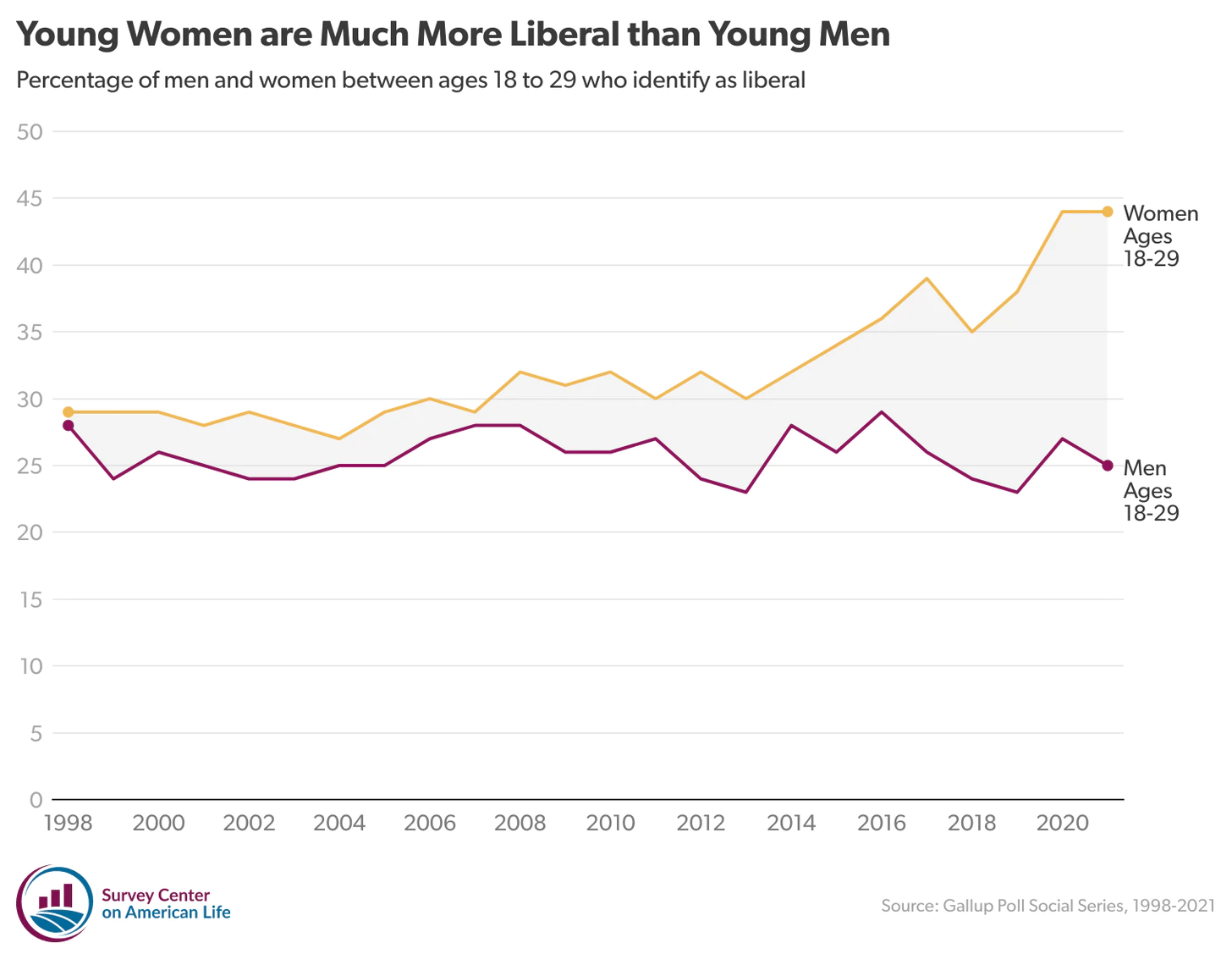The gender gap may seem like headline news when we look at election results, but break it down by generation and it jumps off the page. As pollster Daniel Cox put it, “young women have become significantly more liberal over the past decade whereas the political identity of young men has remained largely unchanged over time.” Politics is almost certainly the tail, here, and not the dog. Women outnumber men in college—enrolling six women for every four men. Women are more likely to identity as LGBTQ—“only 56 percent of young women are exclusively attracted to men, compared to three-quarters of young men who say they are only attracted to women.” Young women are less likely to get married or to affiliate with any religion. Politics is just one piece of the puzzle, but watch this cohort as they enter the age of higher voter turnout.

Follow the Money
There are a lot of reasons not to put much stock in polling right now. It’s only July, for one. Then there’s the dropping response numbers. And the “getting races wrong” part too. So if you’re looking for another way to think about races right now, follow where the campaigns are putting their money. Not because I think the money is meaningful in and of itself. As I’ve said before, we’ve reached a point of highly diminishing returns in a lot of these races. But where campaigns are spending their money can tell you a lot about where they think the race is—and they’ve got a lot more than polling to base their spending on. Registration numbers, volunteer signups, open rates on emails, etc.
Which is why it’s fascinating to see that “Washington’s Democratic Sen. Patty Murray, meanwhile, has spent more than $1 million on television ads in recent weeks” and “a Democratic super PAC has poured $3.9 million into television ads in the Republican primary race to help Ron Hanks” win the GOP nomination in the Colorado Senate race. The hope is that the abortion-outlawing, election-denying option would be the easier candidate for Democratic Sen. Michael Bennett to beat in the fall. Mind you, Joe Biden carried Colorado by 14 points and Washington by 20 points (Audrey’s working on a story about this now—stay tuned.) But two years later, 56 percent and 53 percent of voters in those respective states disapprove of his job performance and Democrats are clearly getting nervous.
I doubt either of these states will flip, but winning them by 3-5 points will require Democratic money, resources, and attention that will get pulled away from states like Wisconsin and Ohio.
It’s Still the Economy, Dumb-Dumb
Whenever anyone tries to tell you that this election will turn on abortion or guns or cancel culture or transgender athletes or literally anything else, here is my response:
From Axios’ Matt Phillips, “Real per capita disposable income — the money consumers can spend after accounting for taxes and inflation — is dropping sharply … In fact, since March 2021 — when the last round of stimulus checks artificially puffed personal disposable income to a record high level of nearly $57,000 — real incomes are down 20%.”
From the Wall Street Journal’s Josh Mitchell, “Since February 2020, the month before the pandemic began, the share of all U.S. jobs located in red states has grown by more than half a percentage point, according to an analysis of Labor Department data by the Brookings Institution think tank. Red states have added 341,000 jobs over that time, while blue states were still short 1.3 million jobs as of May.”
From the New York Times’ Ben Casselman, “Only 31 percent of Americans said they approved of Mr. Biden’s approach to inflation; support was muted even among Democrats, only 58 percent of whom said they approved of Mr. Biden’s approach, and only 15 percent of them “strongly.” And “only 26 percent of Democratic voters said the party should renominate him in 2024” with a third of those voters citing the job performance as the main factor, according to another NYT survey.
From last week, the only silver lining in the economic news—and it ain’t nothing: “While gasoline prices are still $1.50 higher per gallon than they were this time last year, they fell sharply overnight in what was the largest one-day drop in nearly 15 years, according to AAA data.”
Presented Without Comment
The More You Know
Can you believe that 38 percent of Democrats are LGBT? And that a whopping 44 percent of Republicans earn over $250,000 per year? Those stats are from a 2018 study published by the University of Chicago based on 2015 data, but I may have messed up the delivery a little. Actually, it’s that Republicans in the study reported that 38 percent of Democrats are LGBT and Democrats believe that nearly half of Republicans make a quarter-million dollars a year. In truth, 6 percent of Democrats identify as LGBT and 2 percent of Republicans earn that high a salary. Democrats, themselves, also overestimated the number of LGBT members in their own party. But out-group members were far more likely to misperceive the opposing party’s makeup.
And aside from partisanship, interest in politics was also a great predictor of who was more likely to be wrong, i.e., consuming more political news and social media made a respondent more likely to misjudge the makeup of either party. “Interest in political news will be positively correlated with beliefs about the share of partisans belonging to party-stereotypical groups,” the authors reported.
I’d suspect these biases have gotten worse since 2015. But as I keep seeing surveys about young people refusing to be friends with someone who doesn’t share their political beliefs or people who don’t understand that social media curates their feed to show them political content that is most likely to agree with and shield them from alternative viewpoints, it’s worth a reminder that there’s no substitute—not even this newsletter—for striking up a conversation in the grocery store line, calling up a potential new friend for a beer, or asking someone a question about how he views the world and actually listening to the answer. Good luck!
And now Andrew is back with some of his own post-Dobbs political analysis and a reminder that even a small number of “abortion voters”unevenly distributed can make a difference.
How Large Will Abortion Loom in November?
It’s been nearly three weeks since the Supreme Court overturned Roe v. Wade, kicking back to the states—at least for now—the matter of how free or restricted access to abortion should be. It is clear that this was an enormous, staggering change to the body politic; how large the political repercussions will be remains much less clear. On the one hand, the question of abortion is the determining political issue only for a small sliver of the population—a New York Times poll this week ranked it the fifth most prominent issue on voters’ minds going into this year’s midterms, with only 5 percent of respondents and 3 percent of independents calling it the most important problem facing the country today. On the other, the aftermath of the Dobbs decision has seen a not-insignificant swing in generic-ballot polling in favor of the Democrats, suggesting at least some political energy behind Democrats’ crusade to shore up abortion access again.
How this will play out in November is an open question, but the sudden reintroduction of abortion as a political consideration beyond the composition of the Supreme Court is likely to scramble races around the country. And it may not be a simple matter of mobilizing that 5 percent, either—canny Democrats are already using abortion to try to ding Republicans on other issues as well.
Take Georgia, where 2019 anti-abortion legislation signed by Republican Gov. Brian Kemp is soon expected to take effect and where his challenger, Democrat Stacey Abrams, has said she would sign legislation that would make abortion legal up to the point of fetal viability “except in the case of protecting the woman’s life or health”—the standard of the pre-Dobbs status quo. In her attacks on Kemp, Abrams has deployed a bank-shot strategy, using abortion to try to hit the governor where it really hurts—the economy. “I would tell every single business and every single woman that they should do what is best for the women who work for them,” Abrams told CNN the week Dobbs was released, later repeating that businesses should “take into very real consideration the danger that Brian Kemp faces to the life and welfare of women in this state.” The plain implication: a Georgia run by pro-life Republicans is one that will be less attractive to business investment.
In addition, it’s worth bearing in mind that the voters of that 5 percent aren’t equally dispersed around the country. Democrats plainly hope to do an outsize amount of abortion-position damage to Republicans in the suburban House races that are key to determining whether Republicans can retake the lower body. The unexpected success of Republican candidates like Virginia Gov. Glenn Youngkin last year came as a rude awakening to Democrats who had hoped the moderate suburbanite flight from the GOP due to Donald Trump would linger after his departure from the White House. It will be interesting to see whether the abortion question lures any of them back.
ICYMI
Audrey reported a story last week about how both parties see the January 6 hearings as a key fundraising opportunity. “Where millions of Americans see a concerted effort on behalf of a former president to undermine democracy—and still others are unsure of what to make of the day’s events—candidates and political action committees see dollar signs,” Audrey says. Key quote from GOP Rep. Don Bacon: “I’ve learned over [the] last six years that people on both sides will fundraise off any issue … If someone thought they could make money by doing an email on the color of the shoes you were wearing they’d do it.”
Here are some other trends Audrey’s watching this week:
Shapiro Touts the Bipartisan Label. How Far Will That Go?
The Pittsburgh Post-Gazette published a story with the following headline last week: “Group of Pa. Republicans bucking party to endorse Democrat Josh Shapiro for governor.” And who are those officials, exactly? “The list includes two former U.S. representatives, Charlie Dent and Jim Greenwood; former state House Speaker Denny O’Brien; former Lt. Gov. and longtime state Sen. Robert Jubelirer; and former state Supreme Court Justice Sandra Schultz Newman.” The only current official on the list is Lawrence County’s Board of Commissioners Chairman Morgan Boyd.
That’s a lot of “formers.” But there’s two types of endorsements—the first is where the endorsers themselves carry weight with voters (think Jim Clyburn’s endorsement of Joe Biden before the South Carolina primary). The other, though, is far more common—press release endorsements. Even though no one on this list is particularly important, this will be part of Shapiro’s branding as a bipartisan candidate and will still get to boast support from past and current Republicans in his bid against Republican gubernatorial nominee Doug Mastriano this fall.
Democrats Turn on Joe
The White House has spent the past month reeling from a series of unflattering stories about Democrats’ waning confidence in President Joe Biden’s ability to lead the country. Check out this deep dive from CNN’s Edward-Isaac Dovere on just how bad the situation is for the White House. “Top Democrats complain the President isn’t acting with – or perhaps is even capable of – the urgency the moment demands. ‘Rudderless, aimless and hopeless’ is how one member of Congress described the White House.” Voters are getting frustrated too. According to a New York Times/Siena College poll released Monday, a whopping 94 percent of Democratic voters under the age of 30 want someone other than Biden to be the party’s presidential nominee in 2024. It’s no wonder then that vulnerable Democratic incumbents are trying to distance themselves from the president ahead of November. (When asked by Fox News’ Dana Perino last month whether she plans to have Biden join her on the campaign trail ahead of November, Rep. Abigail Spanberger said she “plans to do the campaigning myself.”)
Candidates Matter
Republican Senate frontrunner Herschel Walker can’t seem to stop lying to his campaign about his past. From the Daily Beast’s Roger Sollenberger: “When Herschel Walker’s campaign aides approached him this winter to discuss whispers that Walker had a secret child, the Georgia GOP’s Senate candidate told his campaign the rumors were false. Walker’s aides already knew he was lying. They had expected him to lie, and had obtained documents in advance of that conversation verifying that Walker did indeed have another child, The Daily Beast has learned. They handed the documents to him, and after some more back and forth, Walker finally admitted it was true. His aides asked if there were any other children they needed to know about. Walker insisted this was it.” You can guess what comes next—more undisclosed children he tried to hide from his own campaign.
But wait, there’s more! “He spouts falsehoods ‘like he’s breathing,’ this adviser said—so much so that his own campaign stopped believing him long ago. ‘He’s lied so much that we don’t know what’s true,’ the person said, adding that aides have ‘zero’ trust in the candidate. Three people interviewed for this article independently called him a ‘pathological liar.’” Keep in mind the fact that nearly everyone interviewed for this story disclosed information about Walker’s campaign on the condition of anonymity, a clear sign that people associated with the campaign would rather leak to the press than present their concerns directly to the candidate and his closest advisers.








Please note that we at The Dispatch hold ourselves, our work, and our commenters to a higher standard than other places on the internet. We welcome comments that foster genuine debate or discussion—including comments critical of us or our work—but responses that include ad hominem attacks on fellow Dispatch members or are intended to stoke fear and anger may be moderated.
With your membership, you only have the ability to comment on The Morning Dispatch articles. Consider upgrading to join the conversation everywhere.